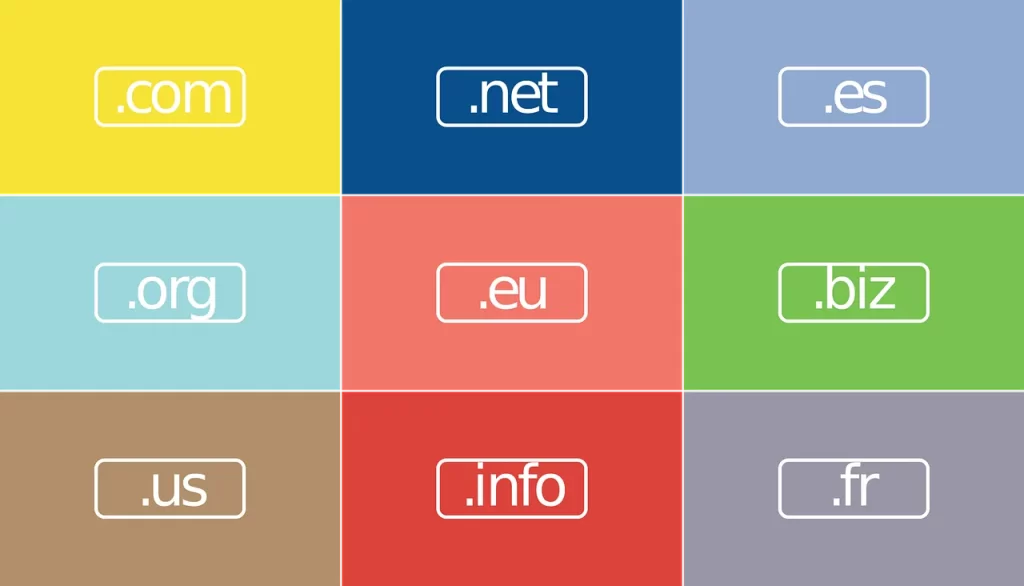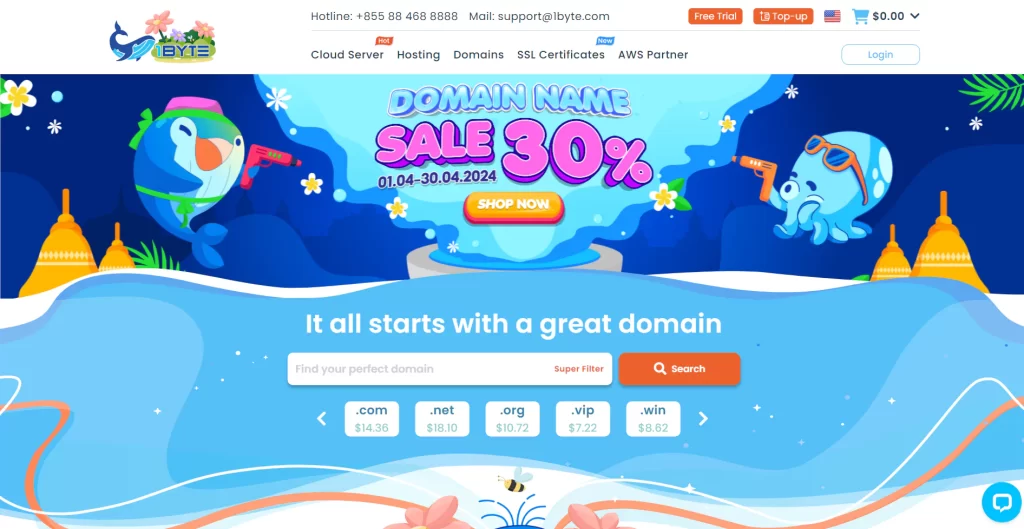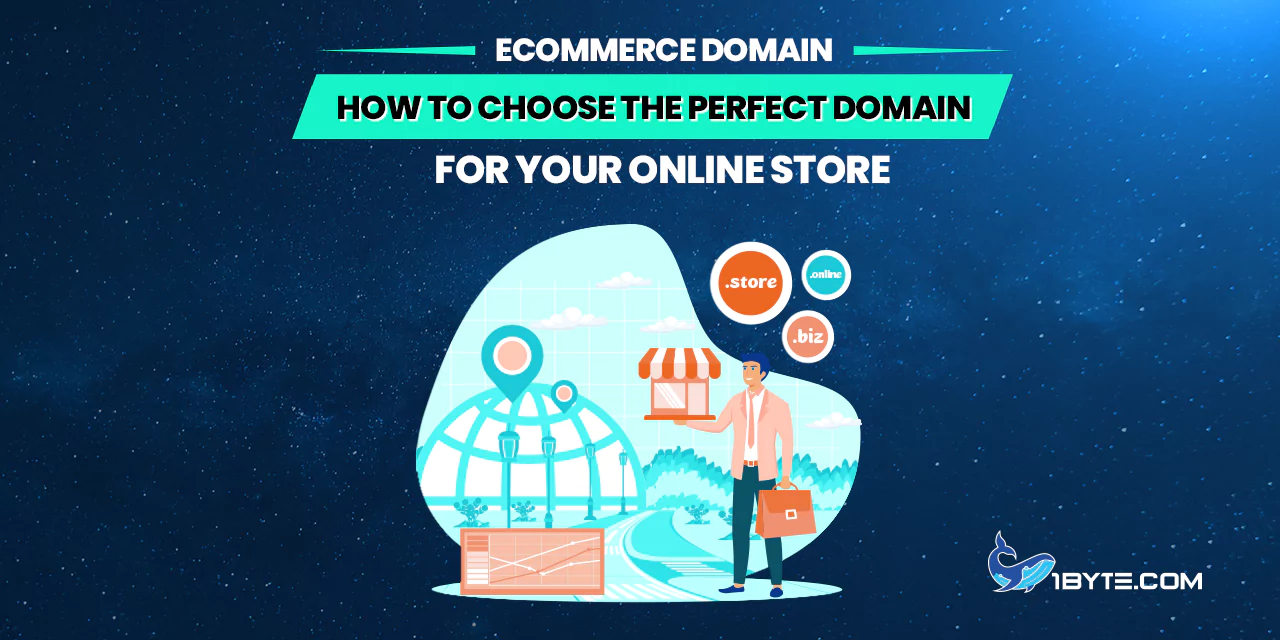Choosing the right ecommerce domain is a critical first step for any online store. This name not only serves as your brand’s online identity but also influences how easily customers can find and remember you. To ensure your domain aligns with your business, consider its relevance to your products and market. Moreover, a memorable and concise domain name can significantly boost your marketing efforts. Today, let’s explore with us at 1Byte how to select an ecommerce domain that optimizes both brand recognition and search engine visibility.
Understanding Ecommerce Domains
Choosing an ecommerce domain is like picking a storefront location in the digital world. This name is not just your online address; it also shapes your brand’s identity and how customers perceive your business. Thus, selecting the right ecommerce domain is crucial for ensuring your store’s success and visibility.

A good ecommerce domain should be clear and memorable. It’s essential that it reflects what you sell, making it easier for customers to connect your domain with your offerings. Also, incorporating relevant keywords can significantly boost your visibility in search results. This strategy attracts more visitors, as they are more likely to click on a domain that matches their search terms.
Moreover, choosing an appropriate domain extension, like .com or .store, can influence customer trust and affect how search engines rank your site. Opt for an extension that not only fits your business but also appeals to your target audience, enhancing both brand recognition and search engine optimization.
Finally, it’s important to keep your ecommerce domain unique yet simple enough to ensure it sticks in customers’ minds, driving repeat traffic and fostering brand loyalty. With careful consideration, your domain can serve as a powerful tool to attract and retain customers.
FURTHER READING: |
| 1. Addon Domain Explained: A Comprehensive Guide |
| 2. Domain vs Subdomain: Understanding the Key Differences and When to Use Each |
| 3. The .biz Domain Meaning: A Deep Dive |
Factors to Consider When Choosing an Ecommerce Domain
Choosing the right ecommerce domain is a critical step in setting up your online store. It’s not just about picking a name; it’s about selecting a domain that aligns with your brand, is easy for customers to remember, and helps with your SEO efforts. In this section, we’ll explore the key factors you need to consider when choosing your ecommerce domain. Let’s dive in!
Simplicity
When it comes to choosing an ecommerce domain, simplicity is key. A simple domain name is easy for customers to remember and type into their browser. It’s also less prone to typos, which can lead to lost traffic.
According to a study by Data Genetics, the most common length of a domain name is about 12 characters. So, aim for a domain name that’s short, sweet, and to the point.
For instance, consider the domain name ‘BobsBikes.com’. It’s short, easy to remember, and clearly communicates what the business sells. On the other hand, ‘BobsBikeAndCycleEmporium.com’ is long, difficult to type, and could be confusing for customers.
Remember, in the world of ecommerce domains, simplicity is your friend. It can make the difference between a potential customer finding your site or landing on a competitor’s page. So, keep it simple, concise, and memorable.
Brand relevance
Choosing a relevant brand name as your ecommerce domain is essential. This decision directly impacts how customers perceive your online store. A domain that closely aligns with your brand not only enhances recognition but also boosts trust and loyalty among your target audience.
Recent studies show that approximately 77% of consumers make purchases based on brand names. Therefore, your ecommerce domain should reflect your brand’s values and product offerings to effectively capture this market dynamic. A domain that clearly relates to your products or services can also improve search engine optimization (SEO), driving more organic traffic to your store.

For example, if you sell organic skincare products, a domain like “PureSkinEssentials.com” immediately informs visitors about the nature of your products and emphasizes the brand’s focus on purity and quality. This clarity helps in building a strong connection with potential customers looking for organic skincare solutions.
Furthermore, incorporating commonly searched keywords related to your business in the domain name can significantly enhance your visibility in search results. Tools like Google’s Keyword Planner or SEMrush offer valuable insights into relevant keywords that could be integrated into your domain for better SEO performance.
SEO friendliness
SEO friendliness is a crucial factor when choosing an ecommerce domain. A domain name that’s optimized for search engines can significantly influence your store’s visibility online. To achieve this, it’s important to incorporate relevant keywords into your domain name that potential customers are likely to use in their searches.
Recent data suggests that domains containing key search terms have a stronger SEO presence. For instance, if you’re selling handmade jewelry, a domain like “HandcraftedJewels.com” could rank better in search results related to handmade or artisan jewelry because it matches common search queries.
Additionally, keeping the domain name concise and easy to spell leads to better SEO results. A short, memorable domain ensures that customers can easily recall and type it into their browsers, reducing the chance of misspellings that lead to lost traffic. According to Google’s SEO guidelines, clarity and simplicity in a domain name help improve search rankings because they enhance user experience.
Moreover, the use of a traditional .com extension often ranks better in SEO compared to less common extensions like .biz or .online. This preference is because .com is more familiar to users, leading to more direct traffic and higher trust, which are factors that search engines consider for rankings.
To further illustrate, a business like “EcoFriendlyApparel.com” benefits from a clear, direct domain that includes relevant keywords such as ‘eco’, ‘friendly’, ‘apparel’—terms likely to be searched by environmentally conscious consumers. This strategic choice not only boosts SEO efforts but also aligns perfectly with the business’s target market.
Domain extension
Choosing the right domain extension is a pivotal decision for your ecommerce domain, especially for us at 1Byte, where we aim to enhance your brand’s digital presence. The domain extension you select can significantly impact your brand’s online identity and influence customer perceptions.
As a leading cloud and hosting provider, we at 1Byte understand the importance of aligning your domain extension with your business type and location. For ecommerce businesses, extensions like .com and .store are popular choices because they are widely recognized by consumers and are often associated with commercial activities.
Statistics reveal that over most domains registered globally have the .com extension. This popularity can lend credibility and a sense of security to your online store, which are crucial for attracting customers. However, for businesses looking to emphasize a modern and tech-savvy image, newer extensions like .tech or .digital might be appealing.
At 1Byte, we help our clients select extensions that not only enhance their site’s SEO but also fortify their brand’s identity. By carefully considering each extension’s impact on both searchability and brand perception, we ensure that your ecommerce domain is optimized for success in the digital marketplace.
6 Steps to Choose the Perfect Ecommerce Domain
Choosing the right ecommerce domain is crucial for any online store’s success. This decision can shape your brand’s online identity and directly impact its visibility and traffic. A domain that is easy to remember, search-friendly, and strongly aligned with your brand will enhance your digital presence.
Reports indicate that nearly 60% of internet users say they trust a business with a domain that matches its business name more. Starting with a clear and concise name can make a significant difference in how potential customers perceive your online store.
Furthermore, recent trends show a shift towards more descriptive and keyword-rich domains, which not only help in SEO but also in marketing your brand’s core offerings right in the URL. For example, if you sell organic products, incorporating words like “organic,” “eco,” or “green” can attract a more targeted audience.
This section outlines six key steps to help you select the perfect ecommerce domain, combining strategic thinking with practical examples to guide you through each stage. From understanding the importance of keyword inclusion to considering long-term brand evolution, these steps are designed to equip you with all you need to make an informed decision.
Brainstorm Domain Names
Brainstorming domain names is the first step towards establishing a successful online presence for your ecommerce store. This process involves generating a variety of names that not only reflect your brand’s essence but also appeal to your target audience. Starting with a creative session can help you come up with unique ideas that might not surface in everyday conversations.
A recent study highlights that domains which include keywords relevant to the business can improve search engine rankings significantly. For example, if you sell vintage clothing, incorporating words like “vintage,” “retro,” or “classic” can attract the right customers and enhance SEO. Tools like Google’s Keyword Planner can provide insights into popular search terms related to your products.
During the brainstorming phase, consider the longevity and adaptability of your domain name. A name that’s too specific might limit your business if you decide to expand your offerings in the future. Conversely, a name that’s too generic might not stand out in a crowded marketplace. Aim for a balance between uniqueness and broad appeal to keep your options open as your business grows.
Remember to check the availability of your chosen names. Websites like 1Byte offer domain registration services and can quickly tell you if your preferred domain is available or already in use. By the end of your brainstorming session, you should have a list of potential domain names that are catchy, relevant, and SEO-friendly, setting the foundation for your ecommerce domain strategy.
Check Domain Availability
Once you have a list of potential names from your brainstorming session, the next crucial step is to check their availability. This step ensures that your preferred ecommerce domain is not already in use or registered by someone else. Using online tools to verify domain availability is straightforward and quick.

Services like us at 1Byte provide a simple search feature where you can enter your desired domain name to see if it’s free. The importance of this step cannot be overstated, as the availability of your top choice can significantly impact your branding and SEO strategies. According to recent statistics, the .com extension, being the most popular, has a high registration rate, making it harder to find available names.
If your chosen name is already taken, these tools often suggest variations and available extensions. For instance, if “BestBikes.com” is taken, you might consider “BestBikes.store” or “BestBikes.shop”. These alternatives can still maintain your brand identity and keyword relevance, crucial for SEO.
Remember, securing your preferred domain quickly is essential, as domain names are unique and can be registered by anyone at any time. Completing this step efficiently moves you closer to launching your online presence and achieving your business goals.
Consider SEO
Considering SEO when choosing your ecommerce domain is essential for enhancing your online visibility. A domain name that includes relevant keywords can significantly improve your website’s search engine ranking. For instance, if you sell outdoor gear, including terms like “outdoor” or “gear” in your domain can help attract more organic search traffic.
Recent data indicates that websites with keyword-rich domains tend to perform better in search results. This is because search engines like Google prioritize domains that closely match common search queries. Therefore, incorporating high-value keywords that reflect your business’s core offerings into your domain name can be a powerful SEO strategy.
Moreover, it’s crucial to balance keyword inclusion with brand identity. While keywords boost SEO, a domain that also represents your brand can increase customer recall and loyalty. For example, “EverestOutdoorGear.com” not only performs well SEO-wise but also clearly communicates the brand’s niche to potential customers.
When selecting your ecommerce domain, also consider the SEO implications of different domain extensions. Traditional extensions like .com are often seen as more trustworthy by consumers and search engines alike, which can affect your site’s credibility and SEO rankings.
Choose the Right Domain Extension
Choosing the right domain extension is a crucial step when setting up your ecommerce domain. This choice can affect how customers perceive your brand and how well your site ranks in search engines. While .com remains the most recognized and trusted extension, there are several other options that may be more suited to your particular business.
Recent statistics show that specific, niche-related extensions such as .store, .shop, or .boutique are gaining popularity among ecommerce businesses. These descriptive extensions can enhance your domain’s relevance and clarity, immediately signaling to users what your website is about. For instance, “BellaBoutique.store” directly communicates that the site is a retail outlet, potentially increasing click-through rates from search results.
Moreover, geographic extensions like .nyc or .london can be beneficial for local businesses looking to connect with a city-specific audience. They not only boost local SEO but also help to attract customers who prefer shopping locally. This can be particularly effective if your ecommerce business has a strong local presence or offers location-specific services.
Additionally, choosing an extension that aligns with your brand can enhance memorability and trustworthiness. For example, tech companies often opt for .tech to emphasize their industry focus, which can aid in brand positioning and digital marketing strategies.
Ultimately, the right domain extension helps ensure your ecommerce domain is not only SEO-friendly but also aligns perfectly with your brand identity and business goals. This alignment is essential for building a strong online presence that attracts and retains customers.
Avoid Trademark Infringement
Avoiding trademark infringement is essential when choosing your ecommerce domain. This precaution helps prevent legal issues that can arise from using a name already trademarked by another company. Ensuring your chosen domain is free from trademark conflicts protects your brand and avoids the cost and disruption of a potential legal dispute.
Recent reports suggest that many new businesses encounter trademark issues simply by not conducting thorough searches. For example, if you select a domain like “QuickTechSolutions.com,” but there is already a “QuickTech” in the tech industry, you could face legal challenges.
To avoid this, always conduct a comprehensive search using the U.S. Patent and Trademark Office’s database or similar resources in your country. This search will reveal whether the name you intend to use is already trademarked. Also, consider consulting with a legal expert who specializes in intellectual property. This step is crucial for navigating the complexities of trademark law.
Furthermore, choosing a unique and distinctive domain name not only minimizes the risk of infringement but also helps in establishing a strong, recognizable brand identity. This distinctiveness not only supports your SEO efforts but also builds a long-term brand presence online.
Register Your Domain
Registering your ecommerce domain is the final and most critical step in securing your online identity. Once you’ve chosen a unique and SEO-friendly domain that’s free of trademark issues, you must officially register it to prevent others from using it. This process solidifies your presence on the internet and marks the beginning of your brand’s online journey.
Recent statistics show that the domain registration market is growing, with millions of new domains being registered each year. This surge highlights the importance of acting quickly once you’ve settled on a domain name. Delaying registration increases the risk of someone else acquiring your chosen name.
To register your domain, choose a reliable registrar. This could be a well-known provider like GoDaddy, Namecheap, or a specialized service like 1Byte that aligns with your business needs. These platforms often offer additional services like privacy protection, which keeps your personal information hidden from the public domain registry.
When registering, you’ll also choose the duration of your registration, which can typically range from one to ten years. Long-term registration can be beneficial as it secures your domain name for a longer period and often comes with a discount.
Finally, once your domain is registered, it’s crucial to manage it properly. Ensure that your registration details are up-to-date and renew your domain before it expires. Many businesses set their domains to auto-renew to avoid accidental loss of ownership, which can be detrimental to your business continuity.
Top 5 Ecommerce Domain Registrars in 2024

Choosing the right domain registrar is crucial for securing your ecommerce domain. As a leading cloud and hosting provider, we at 1Byte pride ourselves on being at the forefront of domain registration services. Here’s a list of the top 5 domain registrars in 2024, starting with us:
- 1Byte: Trusted by a broad base of customers, 1Byte offers seamless domain registration that integrates perfectly with our hosting and cloud services. Our clients benefit from our robust security features, competitive pricing, and dedicated customer support that ensures your domain registration is hassle-free and aligned with your business needs.
- GoDaddy: A global leader known for its extensive domain options and marketing tools, GoDaddy continues to be a top choice for businesses worldwide. Their user-friendly interface and diverse domain extensions make them a go-to for newcomers and experienced users alike.
- Namecheap: With a reputation for affordable pricing and strong customer privacy protection, Namecheap offers a variety of TLDs (Top-Level Domains) and SSL certificates. Their commitment to user-friendly service and security features makes them a preferred option for budget-conscious businesses.
- Bluehost: Often recommended for their integration with WordPress, Bluehost is ideal for those looking to start an ecommerce site with ease. They offer a free domain for the first year when you sign up for their hosting plan, making it a cost-effective solution for startups.
- Dynadot: Known for their straightforward pricing and excellent site management tools, Dynadot makes registering and maintaining domains simple. Their advanced search tools help you find the perfect domain name by suggesting alternatives and variations based on your initial search terms.
By selecting from these top registrars, you can ensure your ecommerce domain is set up for success. Whether you’re looking for comprehensive service packages, budget-friendly options, or specific features like enhanced security, there’s a registrar that fits your business needs. At 1Byte, we are committed to providing you with the tools and support necessary to secure and manage your online presence effectively.
Leverage 1Byte’s strong cloud computing expertise to boost your business in a big way
1Byte provides complete domain registration services that include dedicated support staff, educated customer care, reasonable costs, as well as a domain price search tool.
Elevate your online security with 1Byte's SSL Service. Unparalleled protection, seamless integration, and peace of mind for your digital journey.
No matter the cloud server package you pick, you can rely on 1Byte for dependability, privacy, security, and a stress-free experience that is essential for successful businesses.
Choosing us as your shared hosting provider allows you to get excellent value for your money while enjoying the same level of quality and functionality as more expensive options.
Through highly flexible programs, 1Byte's cutting-edge cloud hosting gives great solutions to small and medium-sized businesses faster, more securely, and at reduced costs.
Stay ahead of the competition with 1Byte's innovative WordPress hosting services. Our feature-rich plans and unmatched reliability ensure your website stands out and delivers an unforgettable user experience.
As an official AWS Partner, one of our primary responsibilities is to assist businesses in modernizing their operations and make the most of their journeys to the cloud with AWS.
Conclusion
Choosing the right ecommerce domain is a pivotal step for any online store looking to establish a strong presence in the digital marketplace. This decision not only affects your site’s visibility and search engine rankings but also plays a critical role in building your brand identity and customer trust.
Recent studies have shown that domains incorporating specific keywords relevant to their business can significantly enhance SEO performance. For example, a domain like “OrganicFoodsMarket.com” immediately signals to both customers and search engines the focus of the business, thereby boosting its online discoverability.
It is also essential to consider factors such as domain extension, trademark clearance, and SEO friendliness during this process. Selecting a domain extension like .com or .store can lend credibility, while ensuring your chosen name is free of legal encumbrances prevents potential future complications.
As you move forward with registering your domain, remember that this name will represent your online business’s front door. Making it simple, relevant, and memorable will help set the foundation for a successful ecommerce venture. By following the steps outlined in this article, you can choose an ecommerce domain that not only aligns with your business strategy but also positions you favorably in a competitive online environment.

